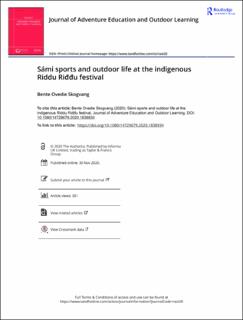Sámi sports and outdoor life at the indigenous Riddu Riđđu festival
Peer reviewed, Journal article
Published version
Permanent lenke
https://hdl.handle.net/11250/2732064Utgivelsesdato
2020Metadata
Vis full innførselSamlinger
Originalversjon
10.1080/14729679.2020.1838934Sammendrag
The indigenous Riddu Riđđu Festival, organized yearly in the village of Olmáivággi/ Manndalen (Sápmi/Norway), presents the cultures of Sámi people and indigenous peoples across the world. A study of the activities offered at Riddu Riđđu over an eleven-year period (2009–2019) carried out. Through fieldwork (forty-six in-depth interviews, participant observations and document analysis), I contemplated how sports, physical and outdoor activities included in the festival create indigenous people’s identities and cultural understanding. Sámi sports and other indigenous sports and outdoor life are crucial parts of the festival, especially at the Children’s Festival: Mánáidfestivála. The activities represent different ethnicities and seem to create sustained ties between persons, networks and organizations and to build identities and bridges between participants. Taking part in festival activities claimed to be crucial symbolic capital, or poly cultural capital, in expressing indigeneity or in the creation of ‘indigenous hearts’ by participants, staff and volunteers at the festival.

